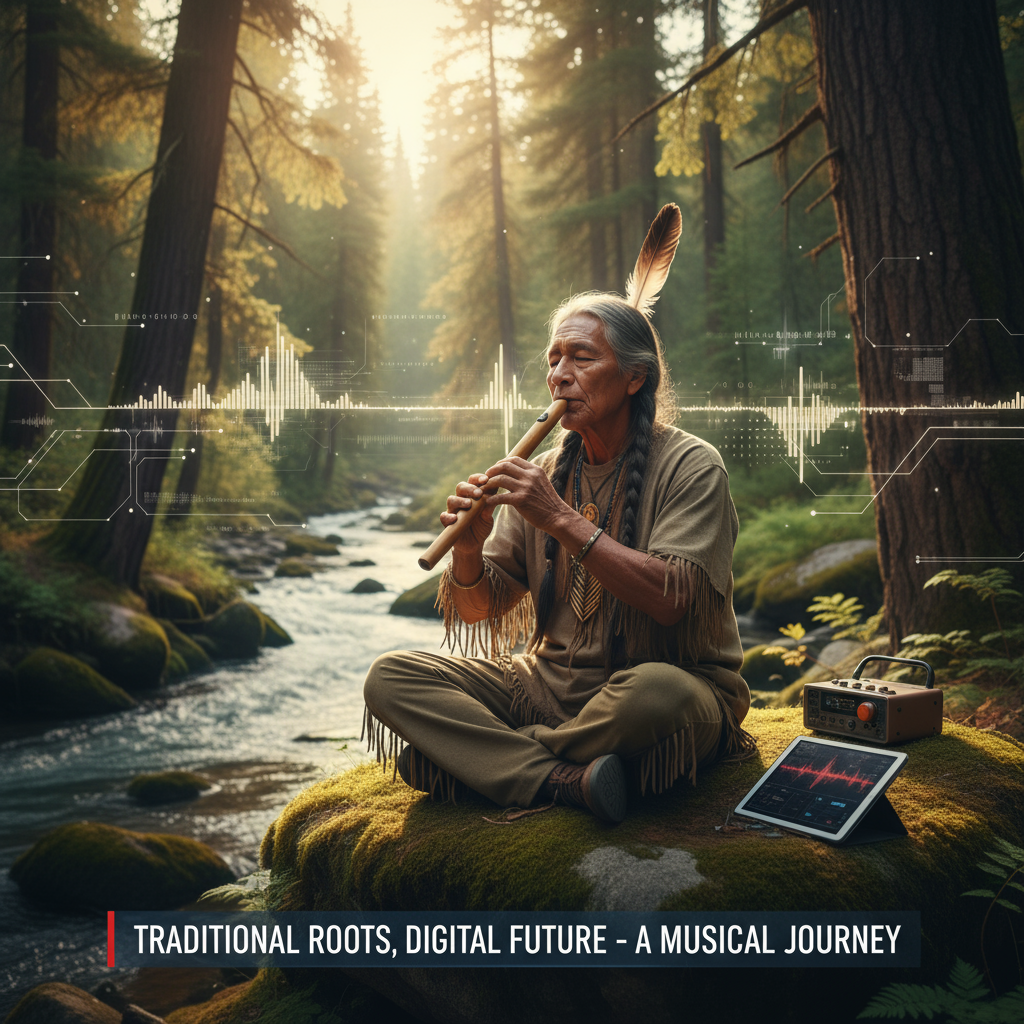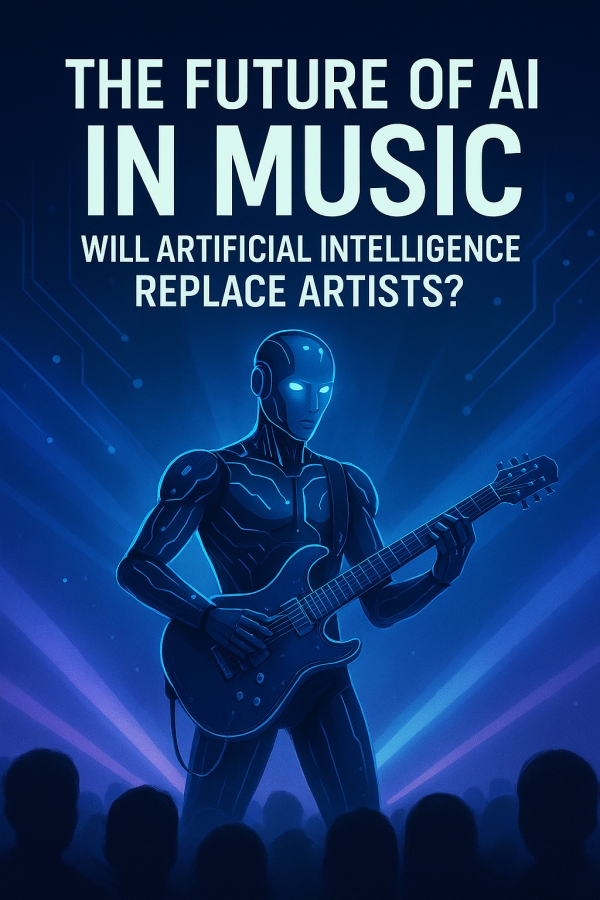The Future of AI in Music: Will Artificial Intelligence Replace Artists?
Introduction
Artificial Intelligence (AI) has rapidly moved from being a futuristic concept to an everyday reality. In industries like healthcare, finance, and transportation, AI has already proven to be a disruptive force. But one of the most fascinating—and controversial—frontiers of AI is its role in the music industry.
Over the past few years, we’ve seen AI models compose symphonies, generate beats, replicate iconic voices, and even perform live concerts in virtual spaces. Some celebrate this as the dawn of a new creative revolution, while others fear it marks the beginning of the end for human musicians.
This blog explores the current state of AI in music, its benefits and drawbacks, and the ultimate question: Will AI replace artists, or will it become a powerful tool that enhances human creativity?
A Brief History of AI in Music
AI in music isn’t as new as it seems. As far back as the 1950s, researchers experimented with algorithms to generate melodies. In the 1990s, programs like Experiments in Musical Intelligence (EMI) by David Cope could mimic the style of famous composers like Bach and Mozart.
Fast forward to today, and AI has gone mainstream:
-
OpenAI’s Jukebox can generate full songs in the style of famous artists.
-
Suno, Aiva, and Boomy allow anyone to create professional-sounding tracks in minutes.
-
Endlesss and Amper Music let producers use AI as a collaborative partner in real-time.
-
Deepfake voice AI can replicate singers so well that some recordings are nearly indistinguishable from originals.
This evolution shows a clear trajectory: AI is not just a tool for experimentation anymore—it’s a full-fledged participant in music creation.
How AI Is Changing Music Creation
1. Songwriting and Composition
AI can generate melodies, harmonies, and lyrics based on prompts. Tools like ChatGPT for lyrics and AI composition platforms for melodies make it possible for anyone to produce a song without prior training.
2. Music Production
AI-powered plugins analyze a mix and automatically adjust EQ, compression, and mastering. Services like LANDR offer instant AI mastering, allowing indie musicians to release polished tracks affordably.
3. Personalized Music
Streaming services like Spotify and YouTube already use AI for recommendations. Now, AI can compose personalized soundtracks for workouts, studying, or relaxation, adapting in real time to listener preferences.
4. Performance and Virtual Artists
Virtual pop stars like Hatsune Miku (powered by vocal synthesis) and AI-driven performers are gaining global fanbases. Even “AI DJs” are appearing on radio stations and in clubs, mixing tracks live.
The Benefits of AI in Music
-
Accessibility for All
AI lowers the barrier to entry, allowing anyone—even without musical training—to create songs. This democratization of music creation empowers hobbyists, independent artists, and even businesses looking for custom soundtracks. -
Collaboration, Not Competition
Many musicians use AI as a creative partner. For example, a producer might generate dozens of chord progressions and then select one to refine. This speeds up workflows while keeping human input at the center. -
Efficiency and Speed
What once took hours in a studio can now take minutes. AI mastering, beat-making, and lyric suggestions save time and costs. -
New Creative Possibilities
AI can generate sounds humans might never think of. Hybrid genres and experimental tracks are being born from AI’s unpredictable creativity. -
Market Expansion
AI-generated background music for videos, podcasts, and video games is booming, creating new revenue streams for platforms and composers alike.

The Controversies and Concerns
While AI brings innovation, it also raises serious ethical, economic, and creative concerns.
1. Authenticity
Can a song generated by AI truly be considered “art”? Music has always been deeply tied to human emotion and experience. Some argue that AI-generated songs lack the soul and authenticity that come from human struggles, triumphs, and lived stories.
2. Job Displacement
Just as automation disrupted manufacturing, AI may threaten careers in the music industry. Session musicians, composers for ads, and even mix engineers could see demand shrink as AI alternatives rise.
3. Copyright Issues
AI models are trained on vast datasets, often including copyrighted material. If an AI generates a track that sounds like a famous artist, who owns the rights? The creator? The AI company? Or no one?
4. Deepfake Voices
The rise of AI voice cloning has led to controversies. In 2023, AI-generated tracks featuring “fake” Drake and The Weeknd went viral. This sparked lawsuits and debates about consent, ownership, and exploitation of an artist’s likeness.
5. Homogenization of Music
Some critics argue that AI may lead to “cookie-cutter” music. If everyone uses the same AI tools, will all songs start to sound alike?
Case Studies: AI in Action
1. Grimes’ AI Experiment
Canadian singer Grimes embraced AI by allowing fans to use her AI-cloned voice in their songs, splitting royalties 50/50. This showed a potential business model where AI can expand, rather than replace, an artist’s brand.
2. Endel – Personalized AI Music
Endel creates adaptive soundscapes for focus, relaxation, and sleep. It even signed a deal with Warner Music, showing how AI-generated music can integrate into the mainstream industry.
3. AI Drake & The Weeknd Song
In 2023, a viral AI-generated track mimicked Drake and The Weeknd’s voices. While fans loved it, Universal Music Group pushed for its removal, citing copyright infringement. This case became a landmark moment in the AI music debate.
Will AI Replace Artists?
The big question: Is AI the future artist, or just another instrument?
Most experts agree that AI will not fully replace human musicians, but it will reshape the role of artists. Here’s why:
-
Human Emotion Is Irreplaceable
Audiences connect with stories, emotions, and lived experiences. AI cannot replicate the heartbreak in Adele’s ballads, the raw rage in punk rock, or the cultural context of hip-hop. -
Artists as Curators
Instead of writing every note, future musicians may act as curators—guiding, editing, and shaping AI-generated ideas into meaningful works. -
Hybrid Creativity
Just as electronic instruments didn’t eliminate guitars, AI will likely become another tool in the studio. The artists who adapt will thrive, while those who resist may struggle. -
New Roles in Music
Musicians may evolve into “AI conductors,” shaping unique collaborations between human inspiration and machine output.
The Future Landscape of Music
1. AI as a Creative Partner
We may see more artists openly collaborating with AI, crediting it as a co-producer. Albums might include tracks partially composed by machines but refined by humans.
2. Rise of Virtual Stars
The success of virtual influencers and vocaloid singers suggests that fully AI-generated celebrities may become mainstream. However, their longevity will depend on whether audiences form emotional attachments.
3. Music for Every Moment
AI could create truly personalized soundtracks—music that adapts to your mood, location, or even heart rate. Imagine a playlist that changes dynamically as you jog, meditate, or celebrate.
4. Legal and Ethical Frameworks
Governments and music organizations will need to establish clear rules around copyright, royalties, and AI-generated content to prevent exploitation.
5. Global Collaboration
AI may enable musicians from across the world to collaborate seamlessly, breaking language and cultural barriers through universal machine-generated sounds.
Conclusion
Artificial Intelligence is transforming the music industry in ways both thrilling and unsettling. While AI can compose, perform, and even replicate human voices, it cannot replace the emotional depth, storytelling, and cultural impact of real artists.
Instead of fearing replacement, musicians should view AI as an evolving instrument—much like the electric guitar or synthesizer once were. Those who embrace and adapt will likely find themselves on the cutting edge of a new musical revolution.
So, will AI replace artists? Unlikely. But it will challenge our definition of artistry, redefine the music business, and forever change how we create and consume music.
The future of music isn’t humans or AI—it’s humans with AI.



